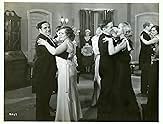A night of love, intrigue, death, and blackmail leaves a stage-star's fate at stake in a conflict with an unscrupulous doctor. A rejected lover dies in an actress' apartment, resulting in bl... Read allA night of love, intrigue, death, and blackmail leaves a stage-star's fate at stake in a conflict with an unscrupulous doctor. A rejected lover dies in an actress' apartment, resulting in blackmail.A night of love, intrigue, death, and blackmail leaves a stage-star's fate at stake in a conflict with an unscrupulous doctor. A rejected lover dies in an actress' apartment, resulting in blackmail.
- Director
- Writers
- Stars
- Director
- Writers
- All cast & crew
- Production, box office & more at IMDbPro
Featured reviews
Louis Jean Heydt's part in the film is interesting, as it was his first motion picture. And he played many parts in movies from 1933 until his death in 1960. There are a few awkward times when his performance in this movie. That is no doubt due to his inexperience.
At the time of Heydt's death, he was appearing in a production of the play There Was a Little Girl, and his co-star opposite was Jane Fonda. He died of a heart attack immediately after the first act of that play, and the performance went on by understudy William Adler.
I love the old movies dating back to this era. Who cares if it moves a little slow at times? There could be a counter-argument made that today's films move much too fast. I also agree with the observation that this one, with its engaging storyline, could be successfully remade today.
Things fail to pick up when Carillo enters as a shady sanitorium doctor who takes over the show. The "hit stage play" this was based upon is not opened up at all in basically a single-set movie drama, and nothing happens as the wax figures yammer on screen. Final reel of twists involving mystery and scandal are merely hot air, unconvincing and stupid. Carillo remains boring throughout until the final minute when the plot is explained stupidly.
Carillo's big line is: "For the love of Mike, get me a cigarette", a bit ironic in that the script has poisoning (presumably from an insecticide) with a capsule of nicotine as the murder weapon.
Acting and direction by Arthur Hoerl is so flat and static it could have been executed via animatronics rather than live actors.
Though ethnic Leo Carillo gets the lead role, the era's discrimination has a Black actress relegated as usual to playing the heroine's strictly functional maid Jenny, and gets no credit at all. The other characters say "Jenny" in conversation dozens of times, so one would think that the role of Jenny would be listed in the credits. And the bland leading man who has plenty of lines and is scheduled to mary Lora goes uncredited, too.
She makes some phone calls. A dead married man in her apartment is not something she wants bruited about. In comes Doctor Leo Carillo. He says it was not a heart attack, but nicotine poisoning, that he found Hicks' will in his breast pocket -- where people always keep them -- and it leaves $200,000 to Miss Baxter. He suggests that he can take the corpse to his sanitarium and report the death as a heart attack for $200,000 in cash by the next day.
This interesting written murder mystery suffers a common issue for Poverty Row dramas of the era: very stagy line readings. However, the excellence of the story and Leo Carillo makes it very worthwhile. Although Carillo is probably best remembered as Pancho on TV's CISCO KID, and frequently played with a Mexican accent, in truth he came from a wealthy Los Angeles family who could trace themselves back to the Conquistadors. His grandfather had been the first provisional governor of California, and his father the first mayor of Santa Monica. Carillo himself was a trained engineer and cartoonist. In the 1930s he excelled at playing threatening villains, although his career turned into one of more standard accent parts in the 1940s. He died in 1961 at the age of 80.
It came as no surprise that "Before Morning" had been a stage play first, because it's acted as if it's still one, with over-the-top dramatization and lines being spoken as if the folks in the rear balcony have to be heard. Also, the storyline (death, cover-up, blackmail, deception, secret identity, etc.) would work well on stage, but somehow didn't work so well on film.
It was a nice try, though.
The good thing is the end of the movie. It actually goes somewhere. It could be redone today with a crisp delivery and the right cast. There are a few surprises that make the movie worth watching.
Leo Carrillo is actually good, but for some reason the acting is slowed down in almost every scene. There also is a great concern about a man and woman having an affair, which seems laughable today.
Is the first line "Good evening, Elvis?" I think that is what she says. Watch it and give me your opinion. This film was made two years before Elvis was born.
Did you know
- TriviaA print of this film survives in the UCLA Film and Television Archives.
- Quotes
James Nichols: Of course, it was a shock, coming in here and seeing... a thing like that, and realizing... even that somehow, well, it hasn't changed me.
Details
- Runtime
- 56m
- Color
- Aspect ratio
- 1.37 : 1




















